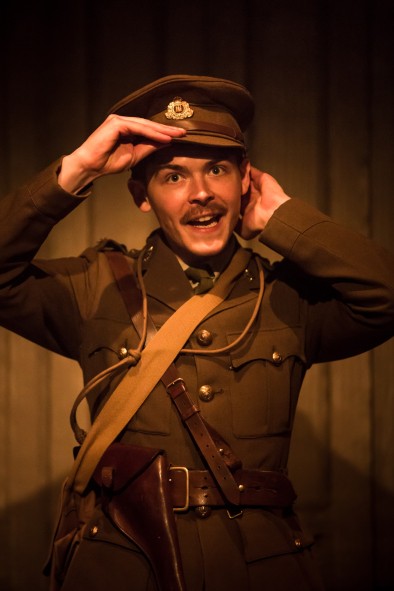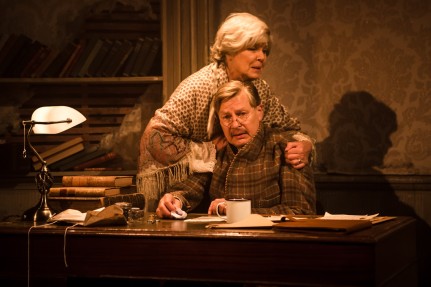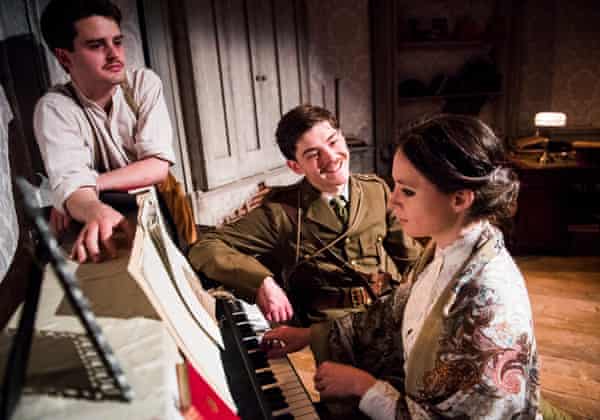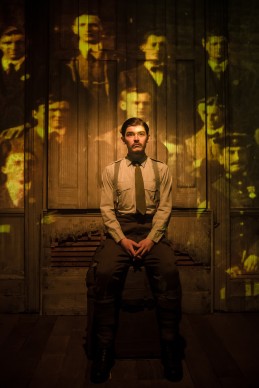It is Easy to Be Dead Play

When poetry of the First World War is mentioned, the names which tend spring to mind are Brooke, Owen, Sassoon, Graves, Blunden and so on. Then there's Charles Sorley. I thought I had a pretty good handle on what constituted the War Poets "group" but had never come across this name before. Yet he and his work are the subject of Neil McPherson's play It Is Easy To Be Dead . McPherson has constructed a modest and compelling drama out of this writer/soldier's poems and letters and told a tale about both this young man and thousands of others like him. The title of the play is taken from Sorley's most anthologized poem Sonnet XXXIV.

Sorley was the son of a Cambridge Professor of Philosophy, educated at Marlborough and due to go to Oxford. He was actually studying in Germany when the First World War broke out but made his way back to Britain and immediately volunteered, joining the Suffolk regiment. He arrived on the Western Front in May 1915; less than twenty weeks later he was dead. In the play he is portrayed by the excellent Alex Knox as a somewhat self- effacing young man of upright character and strong moral principles who finds an outlet in his poetry; this is unsentimental and distinctly critical of the circumstances which have brought the madness of war to pass. Knox rightly does not give a showy performance but it is all the better for being heartfelt and deeply rooted in reality, making the character's death all the more tragic.

The tragedy is not Sorley's alone. His parents are left behind to mourn his loss and sort through his possessions where they begin to discover some of his letters and more poems. Sorley's mother wishes to honour his memory by sending these writings out into the world; his father is less enthusiastic – at one point his usual steely reserve breaks down and he memorably howls "I don't want to share my son!" However, when a cheque for Charles's due wages arrives, they decide to use it to publish. Tom Marshall and Jenny Lee as the Sorleys also give carefully nuanced performances clearly holding their grief at bay with a stoicism which is quietly devastating.

The Finborough stage (where this production was filmed) is not a large one but director Max Key uses it effectively to convey multiple locations. Projections are used tellingly to drive the action forward but also provide a roll call of horror as the death toll mounts. As Sorley mentions various of his peers and contemporaries, we are shown their final fates and it becomes chilling how many of them did not even reach their twentieth year; Sorley does – just. Incidents are punctuated with relevant songs which comment on the action and allow the audience time to reflect on what they are seeing; it is an interesting choice that some of these are sung in German. There were evidently some framing/angling difficulties with the video (probably down to the smallness of the auditorium) which means that it is difficult to see all the space and some of the projections but this does not hugely detract – I imagined myself sitting in one of those limited view seats.

Despite the neat idea of the play being based on the actual writings of Sorley, I think the main issue I had with the piece is that it really didn't have anything new to say that hasn't been covered in a myriad of ways already. We have repeatedly been given the broken lives of these young men and although their treatment should never be forgotten or underestimated perhaps a new way of telling the story needs to be found – something which made Sam Mendes' film 1917 so memorable. However, it did advance the cause of an unjustly neglected poet of the era so for that we should be grateful. Perhaps the next war poetry anthology creator will give Sorely a rather more prominent position alongside his contemporaries.

When you see millions of the mouthless dead
Across your dreams in pale battalions go ,
Say not soft things as other men have said,
That you'll remember. For you need not so.
Give them not praise. For, deaf, how should they know
It is not curses heaped on each gashed head?
Nor tears. Their blind eyes see not your tears flow.
Nor honour. It is easy to be dead.
Say only this, "They are dead." Then add thereto,
"Yet many a better one has died before."
Then, scanning all the o'ercrowded mass, should you
Perceive one face that you loved heretofore ,
It is a spook. None wears the face you knew.
Great d eath has made all his for evermore.
Production photos by S. Rylander
It Is Easy To Be Dead is available on You Tube. Click here
You can read more about Charles Sorley here
To keep up with the blog and all the latest online theatre reviews please click here and choose a follow option
For my Theatre Online list (suggestions and news of newly released productions) please click here. This list is supplemented by daily updates on Twitter (@johnchapman398)
Source: https://2ndfrombottom.wordpress.com/2020/05/18/it-is-easy-to-be-dead-online-review/
0 Response to "It is Easy to Be Dead Play"
Post a Comment